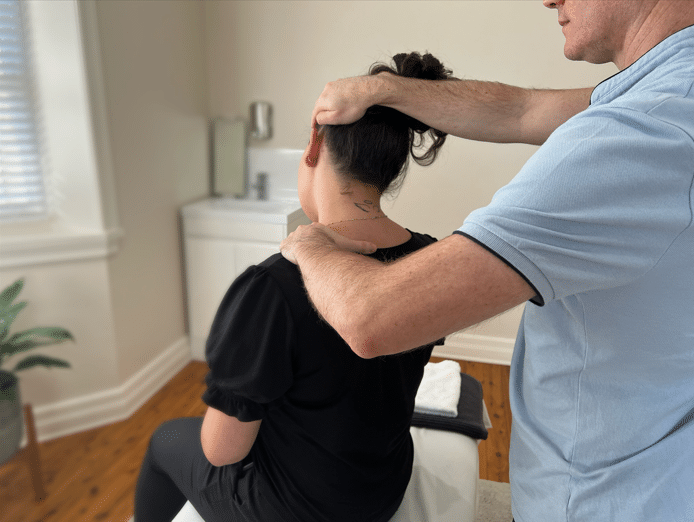- 02 9712 1736
- [email protected]
- 212 Great North Road, Five Dock, NSW 2046
- Open 7 days a week
A stiff neck can make even the simplest daily tasks feel impossible. Many of us have experienced that uncomfortable sensation of limited movement, often accompanied by pain and tension. The discomfort can range from mildly annoying to completely debilitating.
Research shows that neck pain affects 30-50% of adults annually, making it a common issue that requires proper care. While there are many things you can do to alleviate neck stiffness, knowing what to avoid is just as important. By steering clear of these common mistakes and incorporating chiropractic care, you can speed up recovery and prevent future issues.
A stiff neck can significantly disrupt daily life, but avoiding common mistakes and seeking chiropractic care can speed up recovery and prevent future issues. Key missteps include ignoring pain, poor sleeping positions, engaging in high-impact activities, and relying solely on pain medication. Instead, chiropractors recommend early intervention to address root causes like muscle strain or spinal misalignment, using techniques such as spinal adjustments, soft tissue therapy, and ergonomic advice. Gentle movement and proper posture are essential for healing, while professional evaluation ensures personalized treatment. Chiropractic care offers a holistic approach to alleviate pain, restore mobility, and improve long-term neck health.

When your neck starts hurting, don’t push through the discomfort or dismiss it as something that will go away on its own. Pain is your body’s way of signaling that something is wrong. Ignoring these signals can worsen your condition and potentially lead to chronic issues.
Studies published in the Journal of Orthopedic Medicine suggest that early intervention often results in faster recovery times. Chiropractors are trained to assess the root cause of neck pain, whether it’s due to muscle strain, poor posture, or spinal misalignment. Seeking professional evaluation early can prevent minor issues from developing into long-term problems.
Your sleeping position has a significant impact on neck health, especially when dealing with stiffness. Sleeping on your stomach forces your head to turn sideways for hours, putting strain on your neck muscles and joints. A 2019 study in the Journal of Physical Therapy Science confirms this connection.
Instead, opt for sleeping on your back or side with a pillow that supports the natural curve of your neck. Chiropractors often recommend cervical pillows or orthopedic pillows designed to keep your spine aligned during sleep. These small adjustments can make a big difference in both preventing and treating neck stiffness.

When dealing with a stiff neck, avoid jumping straight into intense physical activities like running, contact sports, or heavy lifting. Research from the American Academy of Orthopedic Surgeons shows that high-impact movements can aggravate inflammation and prolong recovery time.
Chiropractors often advise patients to focus on gentle exercises like neck stretches, yoga, or light walking during the recovery phase. These activities promote blood flow and flexibility without putting undue strain on the affected area. Once your neck feels better, a chiropractor can guide you through strengthening exercises to prevent future injuries.

Pain relievers may offer temporary relief but don’t address the underlying cause of your stiff neck. Over-reliance on medication can delay recovery and may even lead to dependency over time, as highlighted in research published in Pain Management Nursing.
Chiropractic care focuses on identifying and treating the root cause of pain rather than just masking symptoms. Techniques like spinal adjustments, soft tissue therapy, and trigger point release target the source of discomfort and promote long-term healing without relying solely on medication.
While rest is important during the initial stages of neck pain, complete inactivity can do more harm than good. A clinical review in The Spine Journal found that prolonged bed rest weakens muscles and stiffens joints, creating a cycle of increasing pain and decreasing mobility.
Chiropractors often recommend gentle movement as part of the recovery process. Simple exercises like chin tucks or shoulder rolls can help maintain flexibility and improve circulation while reducing stiffness.
Poor posture is one of the most common contributors to neck stiffness—and one of the easiest to overlook when you’re already in pain. Hunching over your phone or computer places excessive strain on your neck muscles, a phenomenon often referred to as “text neck.” A 2018 study in the European Spine Journal highlights how forward head posture significantly increases stress on cervical structures.
Chiropractors emphasize proper ergonomics as part of their treatment plans. Adjusting your workstation setup (e.g., raising your monitor to eye level) or taking frequent breaks from screens can help alleviate strain and prevent further injury.


Attempting self-diagnosis or relying solely on internet advice can lead to inappropriate treatment choices—or worse, missed signs of serious conditions like herniated discs or nerve compression. Research in the Journal of Manual Therapy underscores the importance of seeking professional evaluation for persistent neck pain.
Chiropractors are uniquely equipped to diagnose and treat musculoskeletal issues related to stiff necks. They use tools like posture analysis, range-of-motion tests, and neurological assessments to create personalized treatment plans tailored to your needs.
Stress and anxiety often manifest physically in our bodies—especially in areas like the neck and shoulders where tension tends to accumulate. Research in the Journal of Psychosomatic Research confirms this mind-body connection.
Chiropractic care takes a holistic approach by addressing both physical symptoms and contributing factors like stress through relaxation techniques, breathing exercises, and lifestyle counseling.
Managing a stiff neck effectively requires knowing what not to do—and incorporating evidence-based strategies for recovery. Chiropractic care offers a comprehensive approach by addressing both immediate symptoms and underlying causes through techniques like spinal adjustments, ergonomic advice, and therapeutic exercises.
Remember: healing takes time and patience, but avoiding these common mistakes will help you recover faster while preventing future issues. If symptoms persist or worsen despite self-care efforts, don’t hesitate to consult a chiropractor for professional guidance tailored specifically for you.
Your neck supports one of your most valuable assets—your head! Take care of it properly so it continues serving you well for years to come.


Forest Lodge, Annandale, Glebe, Leichhardt, Balmain, Haberfield, Canada Bay, Rozelle, Rodd Point, Wareemba, Stanmore, Petersham, Lilyfield, Hunters Hill, Enfield, Cabarita, Mortlake, Rhodes, Burwood Heights, Birchgrove, Gladesville, Huntleys Point, Abbotsford, Ashfield, Croydon Park, Croydon, Chiswick, Russell Lea, Burwood, Strathfield, Concord, Drummoyne, North Strathfield, Liberty Grove, Dulwich Hill, Lewisham, Camperdown, Ashbury, Homebush, Homebush West, Woolwich, Henley, Summer Hill, Sydney Olympic Park

About
Five Dock Osteopathic & Chiropractic is located in Canada Bay, in Sydney’s Inner West. Servicing suburbs including Burwood, Croydon, Drummoyne, Five Dock, Haberfield, Concord, Abbotsford, Chiswick, Leichhardt, Wareemba, Russell Lea, Summer Hill, Strathfield.
Clinic hours
Monday, Tuesday, Thursday 7AM – 7PM
Wednesday, Friday 7AM – 6PM
Saturday 7AM – 2PM
Sunday 8AM – 2PM
Contact details